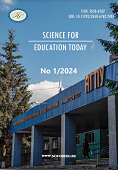Акторно-сетевая интерпретация феноменов и актуальных проблем образования: историцистские основания и специфика
Actor-network interpretation of phenomena and current issues of education: The historicist grounds and specificity
Author(s): Olga Alexandrovna Vlasova, Alexej Gennadievich KornienkoSubject(s): Education, History of Education, Sociology of Education, Philosophy of Education, Pedagogy
Published by: Новосибирский государственный педагогический университет
Keywords: Historicist grounds; Educational models; Poly-disciplinary methodology; Educational spatiality; Pedagogical practices;
Summary/Abstract: Introduction. The research analyzes the changes of ontological and methodological grounds of the philosophy of education in the modern world. The aim of the research is to identify the historicist grounds and specificity of the actor-network interpretation of phenomena and current problems in education. Materials and Methods. The study employs complex and interdisciplinary approaches. The data sources for this problematic research include the latest scholarly publications, tending to apply actornetwork theory in the field of pedagogy and philosophy of education and published in academic journals between 2000 and 2023. The typologisation and comparative methods, along with contextual and textual analysis are used in order to analyze contemporary discussions in this field. Results. Based on the most recent studies, this work reveals the grounds and identifies the specificity of actor-network interpretation of some educational phenomena and problems. During the research the basis of actor-network pedagogy is revealed as historicist ontology, which overcomes the opposition between classical historicism and relativism. The article demonstrates how the reconsideration of ontological and methodological foundations influences the building of terminological glossary of the philosophy of education. The concept of ‘educational spatiality’ is contextualized, which in its turn, makes it possible to analyze a network of educational practices as a complex. Apart from that, the potential of using the tools of the actor-network theory is characterized in a context of research of different educational models from a historical perspective, in materially and contextually heterogeneous networks. It is also claimed that due to its multidisciplinary nature, the actor-network theory can be successfully used to problematize educational phenomena and develop specific teaching strategies. Conclusions. It is demonstrated that actor-network theory, due to its reliance on a new model of historicism, can provide a multidisciplinary orientation of pedagogy and its lability in relation to the modern situation.
Journal: Science for Education Today
- Issue Year: 14/2024
- Issue No: 1
- Page Range: 80-95
- Page Count: 16
- Language: Russian

